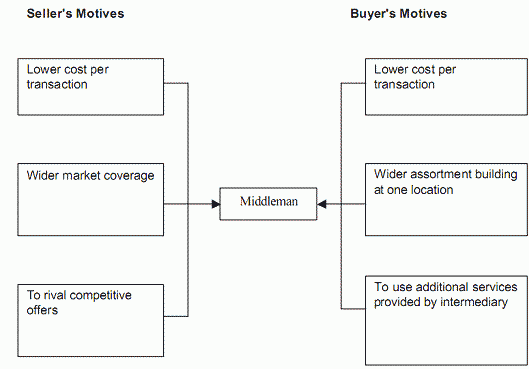Intermediaries
Category: Marketing
In today’s British economy most exchanges are initiated by sellers and they need to devise mechanisms to move product to buyer or buyer to service point. In both cases there will be the need for an information flow about what is on offer. In product channels numerous products have to be collected sorted and transported to the buyer; in service channels numerous buyers have to be (somehow) collected, sorted and transported to the seller. The processes and institutions in the two situations have been subject to different patterns of evolution. For some product channels, powerful middlemen developed and took on many of the activities needed for the transfer. For service channels middlemen have generally been far less powerful and the service provider frequently works directly with the buyer, without middlemen. There are exceptions such as package tour holidays where middlemen assemble the package of services and take responsibility for selling and moving the buyer.
So the emergence of middlemen in a channel arrangement is a frequent characteristic, though not always an essential one.
Buyers and sellers have different motives for wishing to engage middleman as shown in the figure below:
Buyers will be interested in minimizing their costs but their transaction cost for dealing individually with manufacturers could be prohibitive. Middlemen can deal simultaneously with numerous sellers and buyers and so entail lower average transaction costs. Buyers will also wish to purchase a very wide range of goods referred to as wide assortment building. There are considerable economies if they can consolidate their purchasing at a few places rather than having to trip around to many sellers. Middlemen can perform the function of consolidating the wide assortment buyers need. From the seller’s viewpoint there may be a similar cost advantage in usingmiddlemen. A second advantage could be in market coverage. With the help of an intermediary the seller could reach a greater potential market.
Once established a system employing intermediaries can afford further advantages. For the seller the middleman provides a forum in which competitive offers are made, so that the seller can demonstrate the superiority of his offering. For the buyer, the middleman can provide additional services such as repair facilities, the availability of spare parts advice on product use, breaking bulk and repackaging fitting services and sometimes product modifications.
However the possibility of using intermediaries poses problems for the seller. He has to decide whether direct dealing with consumers is feasible and economic. Can he achieve sufficient market coverage with his own resources, at reasonable cost and will this enable competitive advantage? If not what kinds of arrangement are offered by middlemen? Should there be just one channel or are several channels possible? If indirect channels with intermediaries are used then how is the system to be organized and controlled? An if there arc intermediaries between seller and buyer how is the seller to know, and keep track of the changes emerging in what buyers require?

